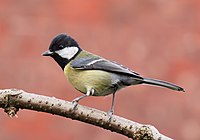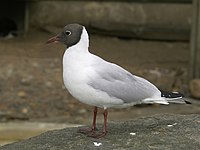
Does habitat structural complexity influence the frequency of extra-pair paternity in birds?
Sign Up to like & getrecommendations! Published in 2017 at "Behavioral Ecology and Sociobiology"
DOI: 10.1007/s00265-017-2329-x
Abstract: Several studies have suggested that vegetation structural complexity can influence the frequency of extra-pair copulations, especially by reducing mating-guarding efficiency. Here we investigate if habitat structural complexity affects broad patterns of extra-pair paternity (EPP) and… read more here.
Keywords: structural complexity; pair; vegetation; extra pair ... See more keywords

An experimental increase in female mass during the fertile phase leads to higher levels of extra-pair paternity in pied flycatchers Ficedula hypoleuca
Sign Up to like & getrecommendations! Published in 2019 at "Behavioral Ecology and Sociobiology"
DOI: 10.1007/s00265-019-2771-z
Abstract: Female mass in most altricial birds reaches its maximum during breeding at egg laying, which coincides temporally with the fertile phase when extra-pair paternity (EPP) is determined. Higher mass at laying may have two different… read more here.
Keywords: female mass; fertile phase; mass; extra pair ... See more keywords

Extra-pair paternity explains cooperation in a bird species
Sign Up to like & getrecommendations! Published in 2022 at "Proceedings of the National Academy of Sciences of the United States of America"
DOI: 10.1073/pnas.2112004119
Abstract: Significance In many monogamous species, a substantial proportion of offspring is sired by other males than the one providing care at the nest. Although females often solicit extra-pair mating, the benefits of extra-pair copulations to… read more here.
Keywords: pair mating; pair paternity; pair offspring; pair ... See more keywords

Experimentally flight-impaired females show higher levels of extra-pair paternity in the pied flycatcher Ficedula hypoleuca
Sign Up to like & getrecommendations! Published in 2019 at "Biology Letters"
DOI: 10.1098/rsbl.2019.0360
Abstract: There is no consensus yet on the reasons why females engage in extra-pair copulations (EPCs). In some species, females have been shown to accrue some indirect benefits, but these effects are not consistent across species… read more here.
Keywords: pair; ficedula hypoleuca; pair paternity; pied flycatcher ... See more keywords

Large-brained birds display lower extra-pair paternity.
Sign Up to like & getrecommendations! Published in 2022 at "Integrative zoology"
DOI: 10.1111/1749-4877.12636
Abstract: Extra-pair paternity (EPP) benefits to improve the reproductive success via extra-pair fertilizations without the costs of parental care in males and through improved offspring quality with additional food and parental care in females among species… read more here.
Keywords: pair paternity; pair; extra pair; size ... See more keywords

Extra‐pair paternity and sexual dimorphism in birds
Sign Up to like & getrecommendations! Published in 2023 at "Journal of Evolutionary Biology"
DOI: 10.1111/jeb.14172
Abstract: Differences in the strength of sexual selection between males and females can lead to sexual dimorphism. Extra‐pair paternity (EPP) can increase the variance in male reproductive success and hence the opportunity for sexual selection. Previous… read more here.
Keywords: epp; pair paternity; extra pair; dimorphism ... See more keywords

Extra-pair paternity in a long-distance migratory songbird beyond neighbors’ borders and across male age classes
Sign Up to like & getrecommendations! Published in 2018 at "Canadian Journal of Zoology"
DOI: 10.1139/cjz-2016-0277
Abstract: Roughly 90% of socially monogamous bird species exhibit some degree of extra-pair paternity (EPP), although the extent and the underlying mechanisms vary among species. We analyzed spatial and demographic patterns of EPP over a 6… read more here.
Keywords: pair paternity; age classes; extra pair; paternity ... See more keywords

Does experimentally altered plumage brightness influence extra-pair mating success in female Tree Swallows (Tachycineta bicolor)?
Sign Up to like & getrecommendations! Published in 2020 at "Canadian Journal of Zoology"
DOI: 10.1139/cjz-2019-0142
Abstract: Recent empirical evidence suggests that ornamental traits displayed by female birds may reflect aspects of their quality, and function during competitive interactions and (or) social mate attractio... read more here.
Keywords: influence extra; brightness influence; altered plumage; extra pair ... See more keywords

High occurrence of extra-pair partnerships and homosexuality in a captive Cape Vulture Gyps coprotheres colony§
Sign Up to like & getrecommendations! Published in 2017 at "Ostrich"
DOI: 10.2989/00306525.2017.1304461
Abstract: The Cape Vulture Gyps coprotheres is an Endangered colonial cliff-nesting species that is typically cited as monogamous. Observations of wild Cape Vulture colonies note extra-pair breeding activities but homosexual activity has never been confirmed. Observations… read more here.
Keywords: cape vulture; gyps coprotheres; extra pair; vulture gyps ... See more keywords